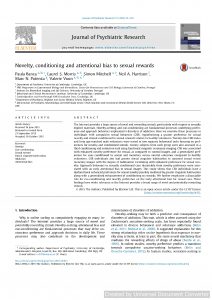Mental Health
Novelty, Conditioning and Attentional Bias to Sexual Rewards
 Full Article Name: Novelty, Conditioning and Attentional Bias to Sexual Rewards
Full Article Name: Novelty, Conditioning and Attentional Bias to Sexual Rewards
Open Access: Yes
Abstract
The Internet provides a large source of novel and rewarding stimuli, particularly with respect to sexually explicit materials. Novelty-seeking and cue-conditioning are fundamental processes underlying preference and approach behaviors implicated in disorders of addiction. Here we examine these processes in individuals with compulsive sexual behaviors (CSB), hypothesizing a greater preference for sexual novelty and stimuli conditioned to sexual rewards relative to healthy volunteers. Twenty-two CSB males and forty age-matched male volunteers were tested in two separate behavioral tasks focusing on preferences for novelty and conditioned stimuli. Twenty subjects from each group were also assessed in a third conditioning and extinction task using functional magnetic resonance imaging. CSB was associated with enhanced novelty preference for sexual, as compared to control images, and a generalized preference for cues conditioned to sexual and monetary versus neutral outcomes compared to healthy volunteers. CSB individuals also had greater dorsal cingulate habituation to repeated sexual versus monetary images with the degree of habituation correlating with enhanced preference for sexual novelty. Approach behaviors to sexually conditioned cues dissociable from novelty preference were associated with an early attentional bias to sexual images. This study shows that CSB individuals have a dysfunctional enhanced preference for sexual novelty possibly mediated by greater cingulate habituation along with a generalized enhancement of conditioning to rewards. We further emphasize a dissociable role for cue-conditioning and novelty preference on the early attentional bias for sexual cues. These findings have wider relevance as the Internet provides a broad range of novel and potentially rewarding stimuli.
Citation
Banca, P., Morris, L. S., Mitchell, S., Harrison, N. A., Potenza, M N., & Voon, V. (2016). Novelty, conditioning and attentional bias to sexual rewards. Journal of Psychiatric Research, 72, 91-101. https://doi.org/10.1016/j.jpsychires.2015.10.017
